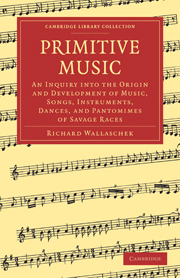 Primitive Music
Primitive Music Book contents
- Frontmatter
- PREFACE
- Contents
- CHAPTER I GENERAL CHARACTER OF THE MUSIC OF PRIMITIVE PEOPLE
- CHAPTER II SINGERS AND COMPOSERS IN PRIMITIVE TIMES
- CHAPTER III INSTRUMENTS
- CHAPTER IV THE BASIS OF OUR MUSICAL SYSTEM
- CHAPTER V PHYSICAL AND PSYCHICAL INFLUENCE OF MUSIC
- CHAPTER VI TEXT AND MUSIC
- CHAPTER VII DANCE AND MUSIC
- CHAPTER VIII PRIMITIVE DRAMA AND PANTOMIME
- CHAPTER IX ORIGIN OF MUSIC
- CHAPTER X HEREDITY AND DEVELOPMENT
- Summary
- List of quoted Authorities
- Index
- Plate section
- Frontmatter
- PREFACE
- Contents
- CHAPTER I GENERAL CHARACTER OF THE MUSIC OF PRIMITIVE PEOPLE
- CHAPTER II SINGERS AND COMPOSERS IN PRIMITIVE TIMES
- CHAPTER III INSTRUMENTS
- CHAPTER IV THE BASIS OF OUR MUSICAL SYSTEM
- CHAPTER V PHYSICAL AND PSYCHICAL INFLUENCE OF MUSIC
- CHAPTER VI TEXT AND MUSIC
- CHAPTER VII DANCE AND MUSIC
- CHAPTER VIII PRIMITIVE DRAMA AND PANTOMIME
- CHAPTER IX ORIGIN OF MUSIC
- CHAPTER X HEREDITY AND DEVELOPMENT
- Summary
- List of quoted Authorities
- Index
- Plate section
Summary
I. A general view of primitive music in Africa, Australia, the South Sea Islands, Asia, and America.
A general view of primitive music shows us that in the most primitive state the main constituent of music has always been rhythm, while melody has remained an accessory. At the same time music is associated with dancing, and in dance-music the idea is to excite the performer and to fatigue him, even to exhaustion. The musical dance-chorus is of a social character; music keeps the company together and enables them to act simultaneously.
II. Singers and composers in primitive times (the human voice).
There was a class of professional composers and singers in primitive times which was highly flattered and well rewarded for the services rendered to the public, but at the same time was very little esteemed from a social point of view. Its power and influence upon the masses was well known, and was very often made use of by the chiefs in their endeavours both to rule the people and to keep up their own reputation. The mode of singing all over the savage world is best characterised by the words, the louder it is the more beautiful, the strength of the voice and the physical perseverance of the performer being chiefly exhibited. Men and women sing at such a high pitch (the former frequently in falsetto) as to have given rise to the presumption that the human voice must formerly have been higher.
- Type
- Chapter
- Information
- Primitive MusicAn Inquiry into the Origin and Development of Music, Songs, Instruments, Dances, and Pantomimes of Savage Races, pp. 291 - 296Publisher: Cambridge University PressPrint publication year: 2009First published in: 1893
